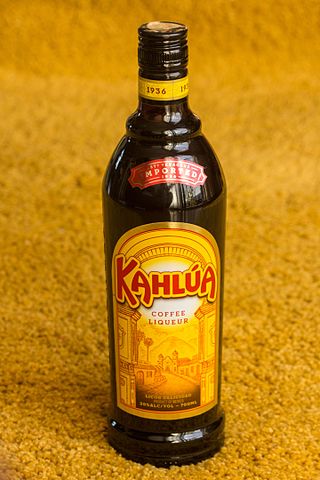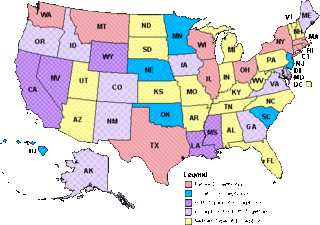Related Research Articles

Kahlúa is a brand of coffee liqueur owned by the Pernod Ricard company and produced in Veracruz, Mexico. The drink contains rum, sugar, and arabica coffee.

Social norms are shared standards of acceptable behavior by groups. Social norms can both be informal understandings that govern the behavior of members of a society, as well as be codified into rules and laws. Social normative influences or social norms, are deemed to be powerful drivers of human behavioural changes and well organized and incorporated by major theories which explain human behaviour. Institutions are composed of multiple norms. Norms are shared social beliefs about behavior; thus, they are distinct from "ideas", "attitudes", and "values", which can be held privately, and which do not necessarily concern behavior. Norms are contingent on context, social group, and historical circumstances.

Alcohol abuse encompasses a spectrum of unhealthy drinking behaviors which range from consuming more than 2 drinks per day on average for men, or more than 1 drink per day on average for women, to binge drinking or alcohol use disorder.

Tap water is water supplied through a tap, a water dispenser valve. In many countries, tap water usually has the quality of drinking water. Tap water is commonly used for drinking, cooking, washing, and toilet flushing. Indoor tap water is distributed through indoor plumbing, which has existed since antiquity but was available to very few people until the second half of the 19th century when it began to spread in popularity in what are now developed countries. Tap water became common in many regions during the 20th century, and is now lacking mainly among people in poverty, especially in developing countries.
Viral marketing is a business strategy that uses existing social networks to promote a product mainly on various social media platforms. Its name refers to how consumers spread information about a product with other people, much in the same way that a virus spreads from one person to another. It can be delivered by word of mouth, or enhanced by the network effects of the Internet and mobile networks.

In social psychology, pluralistic ignorance is a phenomenon in which people mistakenly believe that others predominantly hold an opinion different from their own. In this phenomenon, most people in a group may go along with a view they do not hold because they think, incorrectly, that most other people in the group hold it. Pluralistic ignorance encompasses situations in which a minority position on a given topic is wrongly perceived to be the majority position, or the majority position is wrongly perceived to be a minority position.
Norms are concepts (sentences) of practical import, oriented to affecting an action, rather than conceptual abstractions that describe, explain, and express. Normative sentences imply "ought-to" types of statements and assertions, in distinction to sentences that provide "is" types of statements and assertions. Common normative sentences include commands, permissions, and prohibitions; common normative abstract concepts include sincerity, justification, and honesty. A popular account of norms describes them as reasons to take action, to believe, and to feel.

Solo is an Australian, lemon-flavoured, carbonated soft drink currently manufactured under license by Asahi Breweries. First launched by Tarax in 1968 and fell to Cadbury after a takeover in 1974 its lemon flavour is inspired by Australian pubs' traditional and popular non alcoholic 'pub squash' beverage. The drink's recognition amongst the Australian population has been attributed to the brand's long lasting "Solo Man" marketing campaign, featuring numerous Australian actors. Solo and Asahi Holdings operates in the soft drink manufacturing industry along with various other brands such as Coca-Cola. The usual 375mL can of Solo contains 43.1 grams of sugar. There are and have been in the past, various versions of Solo available. These include Solo Zero, which uses artificial sweetener instead of sugar and there has also been a lemon and lime flavoured variant of the original recipe.
Social marketing is a marketing approach which focuses on influencing behavior with the primary goal of achieving "common good." It utilizes the elements of commercial marketing and applies them to social concepts. However, to see social marketing as only the use of standard commercial marketing practices to achieve non-commercial goals is an oversimplified view. Social marketing has existed for some time, but has only started becoming a common term in recent decades. It was originally done using newspapers and billboards and has adapted to the modern world in many of the same ways commercial marketing has. The most common use of social marketing in today's society is through social media.

Alcohol advertising is the promotion of alcoholic beverages by alcohol producers through a variety of media. Along with nicotine advertising, alcohol advertising is one of the most highly regulated forms of marketing. Some or all forms of alcohol advertising are banned in some countries. There have been some important studies about alcohol advertising published, such as J.P. Nelson's in 2000.
A social issue is a problem that affects many people within a society. It is a group of common problems in present-day society and ones that many people strive to solve. It is often the consequence of factors extending beyond an individual's control. Social issues are the source of conflicting opinions on the grounds of what is perceived as morally correct or incorrect personal life or interpersonal social life decisions. Social issues are distinguished from economic issues; however, some issues have both social and economic aspects. Some issues do not fall into either category, such as warfare.
Neo-prohibitionism is a current movement to attempt to stop consumption of alcohol in society through legislation and policies which further restrict the sale, possession, and marketing of alcohol in order to reduce average per capita consumption and change social norms to reduce its acceptability.
The social norms approach, or social norms marketing, is an environmental strategy gaining ground in health campaigns. While conducting research in the mid-1980s, two researchers, H.W. Perkins and A.D. Berkowitz, reported that students at a small U.S. college held exaggerated beliefs about the normal frequency and consumption habits of other students with regard to alcohol. These inflated perceptions have been found in many educational institutions, with varying populations and locations. Despite the fact that college drinking is at elevated levels, the perceived amount almost always exceeds actual behavior. The social norms approach has shown signs of countering misperceptions, however research on changes in behavior resulting from changed perceptions varies between mixed to conclusively nonexistent.
Alcohol education is the practice of disseminating information about the effects of alcohol on health, as well as society and the family unit. It was introduced into the public schools by temperance organizations such as the Woman's Christian Temperance Union in the late 19th century. Initially, alcohol education focused on how the consumption of alcoholic beverages affected society, as well as the family unit. In the 1930s, this came to also incorporate education pertaining to alcohol's effects on health. For example, even light and moderate alcohol consumption increases cancer risk in individuals. Organizations such as the National Institute on Alcohol Abuse and Alcoholism in the United States were founded to promulgate alcohol education alongside those of the temperance movement, such as the American Council on Alcohol Problems.
H. Wesley Perkins is Professor of Sociology at Hobart and William Smith Colleges in Geneva, New York. He is known as the "father of social norms marketing," which is based on his theoretical formulations and development.

Although the minimum legal age to purchase alcohol is 21 in all U.S. states and most territories, the legal details for consumption vary greatly. Although some states completely ban alcohol usage for people under 18, the majority have exceptions that permit consumption.
Metrosexual is a term describing a man in an urban, post-industrial, capitalist culture who is especially meticulous and scrupulous about his personal style, grooming and appearance. It is often used to refer to heterosexual men who are perceived to be feminine rather than masculine and having traits typical of effeminate men. Nevertheless, the term does not assert whether a metrosexual is heterosexual, gay or a bisexual man, and the gender or sexual orientation of a metrosexual is generally ambiguous and differs in every man. Some academics consider metrosexuals to be exhibiting narcissistic tendencies.

Alcohol is commonly consumed and available at pubs and liquor stores in Australia – all of which are private enterprises. Spirits can be purchased at liquor stores and pubs, whereas most grocery stores do not sell them, although they may have separate liquor stores on their premises. Alcohol consumption is higher, according to WHO studies, than in most European countries and several Central Asian and African countries, although consumption is just as high in Australia as in North America. After tobacco, alcohol is the second leading preventable cause of death and hospitalisation in Australia.

Prime is a range of sports drinks, drink mixes, and energy drinks created and marketed by Prime Hydration, LLC. The range is promoted by YouTubers and internet personalities Logan Paul and KSI. The announcement and the release of the product in 2022 was followed by a social media hype associated with these social media personalities, who have tens of millions of followers combined. It was also promoted through mainstream sports sponsorship deals.

Starry is a lemon-lime soft drink distributed in the United States by PepsiCo. Distribution first began in January 2023. The brand is aimed at competing against Sprite and 7 Up. In January 2023, Starry replaced Sierra Mist as Pepsi's lemon-lime flavored drink, in part because Sierra Mist failed to gain market share in the growing category. Starry contains no caffeine, and as of April 2023 is available in Regular and Zero-Sugar varieties.
References
- ↑ "Social Norms Marketing Reduces High School Drinking". www.alcoholproblemsandsolutions.org. 2004-08-26. Retrieved 2023-12-12.
- ↑ Heubeck, Elizabeth. "What's Your Drinking Personality?". WebMD. Retrieved 2023-12-12.